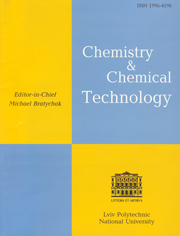Solid Solutions Formation Mechanism in Cordierite-Mullite Glass Materials During Ceramization
| Attachment | Size |
|---|---|
| 1.3 MB |
[1] Carter B., Norton G.: Ceramic Materials Science and Engineering. Springer, New York, London 2007.
[2] Beall G.: Pat. US 7465687 B2, Publ. Oct. 01, 2015.
[3] Logvinkov S.: Tverdofaznye Reakcii Obmena v Tekhnologii Keramiki. HNJeU, Kharkіv 2013.
[4] Toropov N., Poraj-Koshic E.: Strukturnye Prevrashhenia v Steklakh pri Povyshennykh Temperaturakh. Nauka, Leningrad 1965.
[5] Kranold R., Lemcbe R.: 18th Іnt. Соngress Glass, San Francisco, California, ІСG 18 Мееt. Сuide, Westerville, Ohio 1998, 59.
[6] Hong S.-H., Messing G.: J. Am. Ceramic Soc., 1997, 80, 1551. https://doi.org/10.1111/j.1151-2916.1997.tb03015.x
https://doi.org/10.1111/j.1151-2916.1997.tb03015.x
[7] Mirwald P.: Am. Min., 1982, 67, 277.
https://doi.org/10.1007/BF02721167
[8] Miyashiro A.: Am. J. Sci., 1957, 255, 43. https://doi.org/10.2475/ajs.255.1.43
https://doi.org/10.2475/ajs.255.1.43
[9] Wong-Ng W., McMurdie H., Hubbard C., Mighell A.: J. Res. Natl. Inst. Stand. Technol., 2001, 106, 1013. https://doi.org/10.6028/jres.106.052
https://doi.org/10.6028/jres.106.052
[10] Vogel W.: Glass Chemistry. Springer-Verlag, New York, Berlin 1994.
[11] Pimkov Ju., Filatova N., Kosenko N., Bezrukov R.: Ogneupory i Tekhn. Keramika, 2014, 4-5, 22.
[12] Al-Harbi O., Hamzawy E.: Ceram. Int., 2014, 40, 5283. https://doi.org/10.1016/j.ceramint.2013.10.101
https://doi.org/10.1016/j.ceramint.2013.10.101










